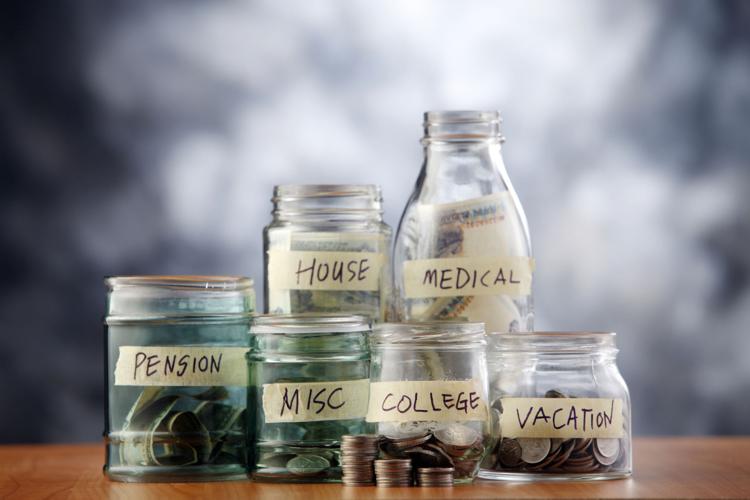If a financial resolution made it on to your 2020 list or vision board this list is for you.
We took a look at some common financial goals people make this time of year, asked a few local experts to share some of their best quick tips to help you jump start those goals and found several local resources that can help you learn more or help you stay on track.
Maybe you've heard some of these before, but sometimes a little reminder helps you remember that you've got this!
Goal: Make a Budget

The first step in working creating a budget it to track your expenses for a month or two to better understand how you're spending your money and where you can cut back, says Scott Bennett, a certified financial planner and executive director of 3rd Decade, a Tucson financial education program for adults in their 20s and 30s.
There are lots of reasons you might want to budget your money. Maybe it's to save for a big expense like a trip, wedding, or new home — or you want to cut back on spending and focus on building your savings or paying down your debt. Whatever it is, your budget is your plan to help you get to those goals.
"The first step is to look at a cash flow analysis for the first couple months," says Scott Bennett, a certified financial planner and executive director of 3rd Decade, a local financial education program for adults in their 20s and 30s. "(Keep track) of what money’s coming in and how much you have to spend and what’s going out."
Then you can look at areas where you can cut spending, Bennett says.
Bennett says participants in the 3rd Decade program are advised to use a plain, straightforward Excel spreadsheet for tracking and budgeting, but it’s important for you to find the system that works best for you.
"There are a million different things and its not one size fits all," he says. "Don’t be afraid to try different tips and tools and see what works for you… if you’re hating every second of it, the chances of you keeping up with it isn’t really going to work."
When designing your budget, Bennett recommends following the 50/20/30 rule, a common budgeting practice.
This method suggests that 50 percent of your income should go to necessities (rent, utilities, etc.); 20 percent should go toward your financial goals (paying down debt, or saving for a vacation for example); and the remaining 30 percent is your discretionary spending (eating out, shopping, all the fun things).
Goal: Pay off credit card debt

Your best option for paying down credit card debt is to work toward paying down your balance on your card with the highest interest first and then the card with the next highest interest rate after and so on, says Scott Bennett, a certified financial planner and executive director of 3rd Decade, a Tucson financial education program for young adults.
If you're ready to say 'goodbye' to some credit card debt this year, the first thing you need to do is take a hard look at your bills and understand what you owe and what you're paying.
"A lot of people think 'I'm paying my minimum on my credit card bill and that's good enough,' when it's not," Bennett from the 3rd Decade program says.
You'll want to look at your interest rates and see how much of what you're paying is going toward interest and how much is going to the actual principal.
There are two ways to approach paying down your balances, Bennett says.
"The back of the book, straight forward answer is to pay off the highest interest credit card first and then focus on paying the others," he says.
But, he also acknowledges that for some people using the "snowball method" is more motivating.
It works like this: you focus on putting any extra money toward your card with the lowest balance while paying the minimums on all your other cards and then once that's paid off and rolling over that money to pay off the next highest card and so forth until they're all paid off.
Goal: Save money

Establishing clear goals for your savings is one of the most important things you can do to ensure your success, says Scott Bennett, executive director of 3rd Decade, a Tucson financial education program for young adults.
If one of your 2020 goals is to spend less and save more, the sooner you start the better.
"The younger you can start saving and thinking about that stuff (like retirement), the better you'll be in the future," Bennett says.
He advises establishing clear goals for your savings as one of the most important things you can do to ensure your success.
"Budgeting should be the first step and then that budget is going to relate to those goals and having something to work toward, not just saying 'I'm going to save as much as I can,'" he says.
Bennett's top tip though involves re-thinking how we spend and save.
"Most people get a paycheck and then spend and then save what they have leftover, when that idea should be flipped on its head," he says. "It's the No. 1 thing people can do when they want to get serious about saving."
There are some simple things you can do like making sure you're fully maximizing your employer's retirement contributions and setting up automatic deposits into personal savings accounts so that money is stashed away before you even see it.
Personal finance resources
Here are a few places you can find personal finance workshops and courses where you'll dive deeper into the three topics mentioned above.
The 3rd Decade Program has been offering its free financial education program for adults in their 20s and 30s since 2015. The course covers topics like investing, housing, insurance, budgeting, and debt and upon completion you'll receive a contribution to a Roth IRA. Classes fill up very fast and there is a waiting list. Go here to learn more about the program and eligibility requirements.
The Primavera Foundation offers free financial empowerment and education classes for qualifying individuals. There is a general course and one for single mothers and their children and another for grandparents raising grandchildren. Go here to learn more.
The YWCA of Southern Arizona in partnership with Score offers free financial literacy courses in English and Spanish covering topics like creating a personal budget, taxes, basic financial planning and emergency funds. Go here for the calendar of events and to learn more.
Goal: Start a business

The Womens's Business Center at the YWCA of Southern Arizona offers business coaching, courses and workshops like the DreamBuilder Bootcamp.
So you’ve got a one-of-kind idea and you’ve always wanted to be your own boss? Now what?
There are lots of organizations in Tucson dedicated to helping aspiring entrepreneurs turn their dreams into realities, if you’re ready to put in the work.
Francisca Villegas-Braker, director of the Women’s Business Center at the YWCA of Southern Arizona, shared her top three tips for anyone looking to start their entrepreneurship journey.
Do some self-reflection
"The first thing you need to do is to identify what it is you want to do. Do some research, what are you good at? What do you have experience in? What’s your background?" Villegas-Braker says. "A lot of times we want to start a business because other people are doing it and just because this other individual is doing well doesn’t mean that you’re going to do well. It has to do with your experience, your background and your passion, because it’s a lot of work and it’s not easy."
Assess your personal credit
There's a good chance you're going to need additional funding to help with startup and other costs associated with launching a business, so making sure your personal finances are in order is important.
"If you’re trying to access capital, your personal credit will be the credit of the business," Villegas-Braker says. "Go to the free annual report website (find that here) and get a free credit report. You can see your FICO score and if things are reported accurately."
Get help
"There're a lot of requirements that you need and you don’t know what you don’t know," says Villegas-Braker. "You want to be in compliance. You might need a City of Tucson license, you might need a Pima County license, you need an EIN number. (There are) all of the requirements to be in compliance with all these different government entities."
Plus, you're going to need a business plan which will help you get funding, structure and grow your business
"A lot of people don’t want to spend time working on the business plan because it’s boring..." Villegas-Braker says. "But it will save you a lot of headaches in the long run."
Here are a few places that will help you work on that business plan, get coaching and connect with other entrepreneurs
Women’s Business Center at the YWCA of Southern Arizona hosts a few different programs in English and Spanish to help all entrepreneurs launch and grow their businesses. Programs include frequent orientation sessions to help get you started and consider if starting a business is the right move for you, one-on-one business coaching and workshops like the upcoming DreamBuilder Bootcamp, a series of 13 classes in which you’ll create a complete business plan to help you gain access to capital. Many of the WBC’s programs are free, and although some do have a fee, scholarships may be available. Go here to learn more about the WBC’s programs and find the full schedule.
Pima County Public Library has a whole range of workshops and services to help with aspiring and current business owners and nonprofit organizations through its Ignite program. Free sessions are hosted at four different libraries in the community and include topics like "Want to Start Your Own Business?"; "Simple Steps for Starting your Business: Financial Projections"; and one-on-one mentoring from the SCORE program. Follow the Ignite page on Facebook here to see all the offerings, or the library’s calendar of events here.
SCORE Southern Arizona offers free one-on-one business consulting and mentoring services and workshops. Mentors are volunteers who are dedicated to helping entrepreneurs succeed. Upcoming workshop topics include marketing your business, financing your business and turning your idea into a viable concept. Go here for details.
Startup Tucson has a number of business education courses, coaching and networking events to connect you with mentors and other entrepreneurs. Learn more about their programs and events here.
Goal: Become a homeowner

Buying a home is a major life milestone and if 2020 is the year you hope to find a place of your own you'll want to spend less time watching HGTV and more time looking for the right lender to help you along the way.
Elia Jaime-Bracamonte, producing branch manager with Sunstreet Mortgage has worked in the banking and mortgage industry for more than 14 years. She says that before you start looking for the home of your dreams, you first need to look for a local lender you want to work with.
"Talking to a lender is the very first step you have to take to learn if you are ready to qualify, what program options you have and what is it going to take to get there," she says. "Unfortunately, I have sat down with buyers that come to see me after they have fallen in love with homes only to find out that the payment and down payment required for that home is out of their range of qualifying for or affording."
She says there are several local and federal programs that offer down payment assistance available to home buyers who qualify for those programs (usually dependent on income and location you are purchasing in) and working with an experienced lender can help you understand what all your options are.
You can find a lender by asking for a referral by someone you know and trust, or do some online research to find someone you want to work with.
"If researching online, social media — Google, Zillow or LinkedIn — would be good sources to see what their previous clients reviews and testimonials," Jaime-Bracamonte says. "While you're there take a look at their bio, if it is available to see their experience on the field."
Then it's on to the next step.
"Once you meet with a lender, then you can meet with a local realtor that will sit with you to learn what is that you are looking for in your home… then the fun part begins — house hunting," she says.
Here's a couple of local resources offering home buyer education and info about down payment assistance programs:
Family Housing Resources offers free comprehensive home buyer education classes, down payment assistance options and pre-purchase counseling which includes viewing your credit history, disputing errors, creating a plan to eliminate debt, determine which loan is best for you and other counseling services to help you through the process. Go here to learn more about the courses and services.
The Primavera Foundation offers free home buyer education courses for families with low-to-moderate income to learn how to find a lender, get a safe loan and find down-payment assistance. Learn more about this program here.
Pima County has a collection of the many different down-payment assistance and first-time home buyer programs on its Home Buyer Resources page. Go here to find a bit of generic info and links to the Tucson/Pima County HOME Down payment Assistance Program, Pima County Community Land Trust, Mortgage Credit Certificate and Pima Tucson Homebuyer's Solution Program. These programs each have their own eligibility requirements based on income levels and the location you're looking to buy in.
A group of realty, insurance, title and mortgage companies hosts a First Time Home Buying Class every month at the Catalyst Arts & Maker Space at Tucson Mall, 4500 N. Oracle Road. The class happens every second Saturday of the month from 10 a.m. to noon and helps first-timers learn more about the home-buying process. The next class is on Feb. 8, go here for more information.










